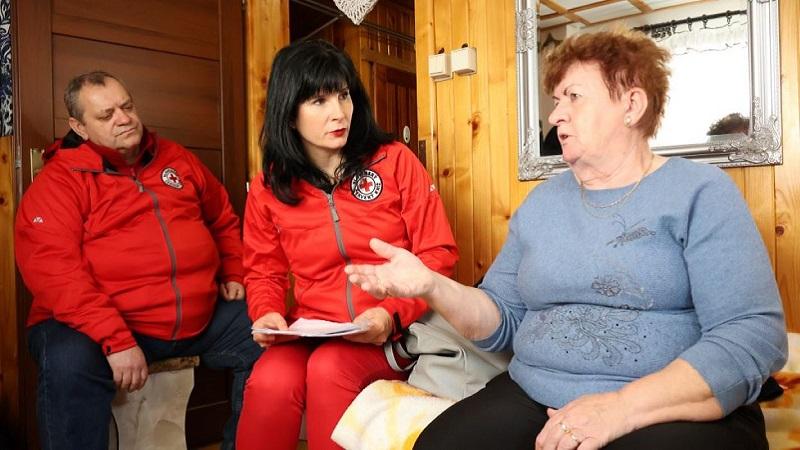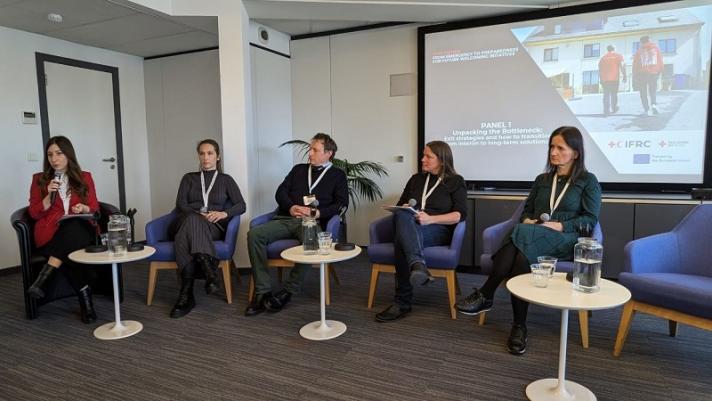
”When I came to Slovakia, I had nothing. Júlia gave me food and everything I needed. I feel so good here,” says Verona from Ukraine who has found a new home in Slovakia. Her host, Júlia, accommodates six other Ukrainian women in her house: ”We share our lives together, laugh, and enjoy each other’s company.”
Like Júlia, many others around the EU opened their homes to people fleeing the war in Ukraine through the EU funded Safe Homes Programme. This project was set up under the European Commission’s Safe Homes initiative to support private hosting actions for Ukrainian refugees, in cooperation with public authorities and the private sector.
On 24 April, Commission staff along with representatives of several EU Member States met to assess the impact of the Safe Homes project at the 40th Solidarity Platform meeting, and at the event organised by the Red Cross: “Safe Homes: From Emergency to Preparedness for Future Welcoming Initatives”. Participants delved into lessons learnt in community-based housing and integration.
Since its launch in March 2022, the Safe Homes initiative has demonstrated the power of collaboration between national and local authorities, civil society, and private hosts in providing refuge and essential services for displaced individuals. Around 5 700 families displaced from Ukraine received assistance to access education, trainings, healthcare, and support in finding their own accommodation. Over 8 800 monitoring visits and interviews were conducted to ensure that the accommodation provided was safe and suitable. Additionally, around 150 mentoring sessions were held to support both hosts and hosted people and help them cope with the challenges associated with private hosting initiatives.
During the project’s implementation, several valuable lessons were learnt. For instance, hosting, which is a crucial solution in crisis situations, must be complemented by a broader strategy towards independent living in the long term. Detailed planning and implementation of hosting schemes, supported by clear exit strategies and a focus on integration have proved to be the key to the project’s success.
The upcoming Safe Homes Lessons Learnt report and Practitioner Handbook, produced by the Red Cross as part of the Safe Homes project, will further reflect on how to activate the Member States, local and regional authorities, civil society, private hosts and all other stakeholders who are willing to help integrate people who are coming or are already in the EU. The similarities between the two types of schemes will also be highlighted in the upcoming “Guidelines on the EU approach to community sponsorship” under preparation by the EU Asylum Agency.
Background
The Safe Homes programme was announced by Commissioner Johansson during the High-Level Forum on legal pathways to protection in 2022 and is implemented by the International Federation of the Red Cross and several Red Cross and Red Crescent National Societies in Europe. It currently runs in Belgium, France, Ireland, Hungary, The Netherlands, Luxembourg, Poland, Romania, and Slovakia.
The programme also helps implement and builds on the Safe Homes guidance, published by the Commission in July 2022. It was developed to help EU countries, regional and local authorities, as well as the civil society actors involved, assess housing needs and map private hosting initiatives.
In November 2022, the Commission set up an Emergency Assistance scheme under the Asylum Migration and Integration Fund (AMIF) to support the International Federation of the Red Cross (IFRC) in the implementation of the Safe Homes project.
More information:
Details
- Publication date
- 24 April 2024
- Author
- Directorate-General for Migration and Home Affairs

